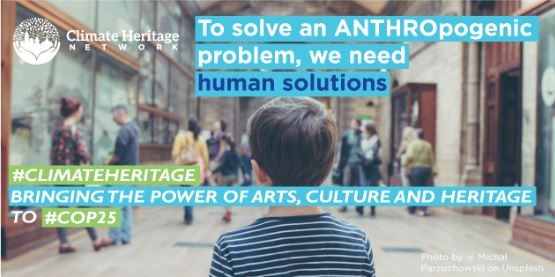Climate Heritage Network releases ambitious Action Plan on heritage and climate change at COP25
The newly launched Climate Heritage Network (CHN) has just released an Action Plan entitled the Madrid-to-Glasgow Arts, Culture and Heritage Climate Action Plan, featuring viable solutions to tackle climate change and achieve the ambitions of the Paris Agreement. The Action plan was released on 5 December during the 2019 United Nations Climate Action Summit (COP25) taking place between 2-13 December in Madrid.
The #ClimateHeritage Network’s Madrid-to-Glasgow Arts Culture & Heritage #ClimateAction Plan just released at #COP25! Its aim: help close the ambition gap by foregrounding climate change’s cultural dimensions, building to 2020’s #COP26 in Glasgow. Join us! https://t.co/NsOrLdAAva pic.twitter.com/aWYRf2szrb
— ClimateHeritage (@ClimateHeritage) December 5, 2019
Only five weeks after its official launch on 25 October in Edinburgh, the Climate Heritage Network (CHN) is committed to act and has used the COP25 global event as a platform to bring forward a practical Action Plan. The Action Plan showcases the relevance of arts, culture and heritage to climate action and presents a manageable list of practical activities. The Plan features eight initial activities designed to deliver scalable, culture based climate action tools and policy solutions for achieving the ambitions of the Paris Agreement.

The eight activities address:
1. Communicating the Connection between Cultural Heritage and Climate Action
Improving communication with the aim of promoting climate action through more effectively illustrating the potential for cultural heritage to help address the challenges of climate
change.
2. Valuing Traditional Knowledge
Developing materials that make the case for valuing traditional knowledge as climate change technology and gathering examples of sustainable traditional practices that support climate action– including traditional building materials, construction and design.
3. Making the Case for Building Reuse through Better Metrics for Avoided Operational and Embodied Carbon
This activity aims to gather data on greenhouse gas (GHG) benefits of building reuse and retrofit; work with researchers and practitioners to help establish and to quantify carbon benchmarks for rehabilitation/upgrades; and develop methodologies for correlating these benefits with carbon budgets established for relevant jurisdictions.
4. Mainstreaming Culture and Heritage into Climate Planning
Recommending practices for mainstreaming arts, culture and heritage into climate action plans, adaptation frameworks, and National Determined Contributions (NDCs). Developing a database of relevant provisions from local, regional and national climate plans that address the role of arts, culture or heritage, including provisions on respecting the cultural rights and knowledge of Indigenous Peoples.
5. Using Culture to Promote Climate Resilient Sustainable Development
Contributing a climate change dimension to the work of the global campaign of cultural networks (#culture2030goal) on culture in sustainable development.
6. Coordinating Cultural Heritage Safeguarding and Climate Action
Coordinating cultural heritage safeguarding and climate action by promoting strong linkages to urban and territorial planning policies and impact assessment processes.
7. Supporting Climate Action by Local Communities and Indigenous Peoples
Supporting the cultural dimensions of the implementation of the two-year work plan developed by the Facilitative Working Group (FWG) for the UNFCCC Local communities and Indigenous Peoples Platform (LCIPP).
8. Building the Arts, Culture and Heritage Constituency for COP26
Establishing a pool of cultural heritage actors equipped to participate in COP26 and similar climate change policy meetings.
The Climate Heritage Network Action Plan is coordinated and developed by the CHN Steering Committee, composed of international leaders working at the intersection of climate action and arts, culture and heritage. Among the 21 members of the CHN Steering Committee is Sara Crofts, Council Member of Europa Nostra and Chief Executive of The Institute of Conservation (UK), providing her expertise in communicating the connection between cultural heritage and climate action.
The initial results of the activities implemented and the impact of the Madrid-to-Glasgow Arts, Culture and Heritage Climate Action Plan will be delivered at the 2020 edition of Conference of Parties (COP26) which will run from 9-19 November 2020 in Glasgow.
Europa Nostra is active in mobilising the cultural heritage sector for climate action across the globe and is a member of the Climate Heritage Network (CHN), figuring among the founding signatories of the Climate Heritage Memorandum of Understanding. The devotion to sustainable development through cultural heritage, and the fight against climate change are key priorities of Europa Nostra. Europa Nostra has repeatedly stressed the importance of this topic,most recently at the European Policy Debate held on 30 October in Paris with the release of the Paris Manifesto: ‘Relançons l’Europe par la culture et le patrimoine culturel !’ as its key outcome






